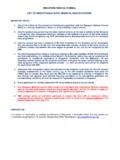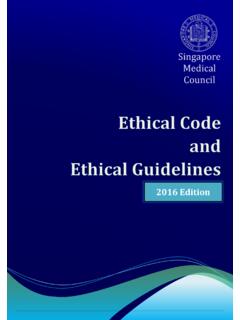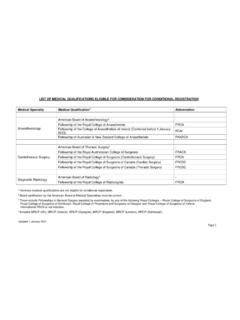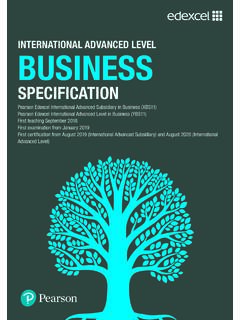Transcription of CORE COMPETENCIES OF REGISTERED NURSE - MOH
1 Page 1 of 10 Revised April 2018 SINGAPORE NURSING BOARD CORE COMPETENCIES OF REGISTERED NURSE REGISTERED nurses (RNs) utilise evidence-based nursing knowledge and professional nursing judgement to assess health needs, provide nursing care, educate clients and support individuals to manage their health holistically. They practise in collaboration with other healthcare professionals. They are accountable for their scope of practice including the supervision and delegation of nursing activities to the enrolled nurses and nursing assistants. RNs may practise in a variety of clinical contexts depending on their education preparation and practice experience. Core COMPETENCIES The Singapore Nursing Board s Core COMPETENCIES for REGISTERED NURSE are a set of minimum standards of performance that define the requisite qualities, attributes and skills for a RN to practise in Singapore.
2 These Core COMPETENCIES supplement the Code for Nurses and Midwives to define the minimum level of performance of a RN and is set at the entry to practice level. The Core COMPETENCIES are not setting specific; they are applicable to any practice setting. The Core COMPETENCIES set the foundation for RNs to maintain their competence and to acquire additional COMPETENCIES or advanced clinical skills to deliver safe client care in response to changing healthcare needs and advancement in technology. Purpose of Core COMPETENCIES (1) Inform nurses on the minimum COMPETENCIES for RN practice. (2) Direct pre-registration nursing curriculum development and review. (3) Guide the competency development and assessment of students and newly graduated RNs. (4) Assess the COMPETENCIES of internationally qualified nurses seeking employment in Singapore. (5) Assess nurses seeking re-registration. (6) Evaluate nurses involved in professional disciplinary cases.
3 Related Definitions Core COMPETENCIES : a standard set of performance domains and their corresponding behavioural standards which a NURSE is required to demonstrate. Competency: the necessary knowledge, skills and attitudes a NURSE must possess in order to perform a set of defined activities to an expected standard. Competence: the ability of a NURSE to demonstrate the knowledge, skills , judgment and attitudes required to perform activities within the defined scope of practice at an acceptable level of proficiency. Competent: being able to demonstrate the necessary ability, knowledge, skills and attitudes across the domains of COMPETENCIES at a standard that is determined to be appropriate for that level at which a NURSE is being assessed. Page 2 of 10 Revised April 2018 Core COMPETENCIES of REGISTERED Nurses A REGISTERED NURSE (RN) is a person who has completed a professional pre-registration nursing programme accredited by the Singapore Nursing Board (SNB) or its equivalent, for the purpose of registration, or has been assessed to be competent to practice as a RN.
4 The Core COMPETENCIES are organised into 4 domains. A domain is an organised cluster of COMPETENCIES . Each domain has associated competency standards, with each standard representing a major function/functional area to be performed by a RN. Competency indicators represent sub-functions of a competency standard. Competence Domain 1: Professional, Legal and Ethical Nursing Practice Competence Domain 2: Management of Care Competence Domain 3: Leadership and Nursing Management Competence Domain 4: Professional development Domain Competency Standard Competency Indicators 1 Professional, Legal and Ethical Nursing Practice Demonstrate understanding, knowledge, accountability and responsibility of the legal obligations for nursing practice. a) Understand the legislative framework, the role of the SNB and its regulatory functions; the SNB Code for Nurses and Midwives. b) Practise in accordance with institutional/national legislation, policies and procedural guidelines.
5 C) Maintain clear and legible documentation and records. d) Ensure own physical, cognitive, psychological & emotional fitness to practice and deliver safe care. e) Recognise differences in accountability and responsibility of the RN and EN in the provision of care. f) Demonstrate responsibility and accountability for care within scope of practice and level of competence. g) Practise in accordance with the expected COMPETENCIES of RN. h) Support, collaborate and co-operate with team members and other healthcare professionals. Demonstrate and maintain ethical nursing practice. a) Comply with SNB Code for Nurses and Midwives. Provide culturally appropriate care. a) Respect the values, customs, spiritual beliefs and practices of individuals and groups. b) Recognise own beliefs and values and how these may influence care giving. Page 3 of 10 Revised April 2018 Domain Competency Standard Competency Indicators 2 Management of Care Demonstrate effective communication.
6 A) Listen, clarify and communicate clearly through verbal/non-verbal, written and electronic means as appropriate to ensure effective communication with clients, families and other healthcare professionals. Ensure consistent and continuous holistic quality of care. a) Perform comprehensive and systematic client assessment. b) Formulate a plan of care in collaboration with the healthcare team, clients, and families. c) Implement and documents planned nursing care in a timely manner. d) Evaluate and modify plan of care to meet expected outcomes. e) Demonstrate critical thinking, problem solving and clinical reasoning in decision making. f) Utilise well-conducted/evaluated research findings in practice as appropriate (practice based on evidence). g) Participate in decision-making concerning care of clients as well as coordinating their care with other healthcare professionals/providers.
7 H) Collaborate with clients, families, nursing colleagues, other healthcare professionals /providers and the community to ensure continuity of quality care. i) Maintain and update technical/clinical skills related to nursing practice. Maintain safe environment through the use of quality assurance and risk management strategies. a) Provide a safe environment for clients and staff, including implementing infection control procedures. b) Participate in continuous quality improvement and quality assurance activities. c) Reflect on practice outcomes and makes changes to practice when appropriate. d) Delegate, monitor and supervise work performed by the EN and other ancillary care staff. e) Acknowledge limitations in knowledge and competence and seeks help on competency gaps. Apply strategies to promote health and prevent illnesses. a) Conduct educational needs assessment. b) Apply principles of learning and teaching in health promotion and education for individuals, groups & communities.
8 C) Teach aspects of care to clients, families, carers and health professionals as appropriate. d) Acquire and provide appropriate written resources for clients and their carers when needed. Page 4 of 10 Revised April 2018 Domain Competency Standard Competency Indicators 3 Leadership & Nursing Management Demonstrate effective managerial and leadership skills in the provision of quality nursing care. a) Demonstrate delegation and supervision skills . b) Demonstrate ability to make appropriate management decisions. c) Apply critical thinking skills within a problem-solving context. d) Initiates and engages in dialogue on new initiatives and change processes in nursing and healthcare. Use principles of quality improvement and incorporates them into nursing practice. a) Collect, analyse and utilise data about incidents and trends, and implements strategies to improve care delivery.
9 B) Demonstrate elements of efficient resources utilisation and management, including manpower. c) Understand and applies safety measures and guidelines/standards in one s practice. d) Participate in safety and quality improvements projects/ initiatives. Provide a safe working environment. a) Perform hazard and risk analyses. b) Demonstrate knowledge of occupational health and safety legislation, including infection control policies and procedures. c) Plan, organise, supervise, monitor and evaluate workplace health & safety practices. d) Manage workloads effectively by raising concerns and/or seeking consultation and help where applicable. e) Support, collaborate and cooperate with team members and other healthcare professionals. 4 Professional development Demonstrate accountability for one s development and status as a professional REGISTERED NURSE .
10 A) Promote and maintain the professional role of the NURSE by upholding the Code for Nurses and Midwives. b) Reflect on current nursing practice and applies evidence-based and/or best practice knowledge and technical skills . c) Participate in and contribute to research/evidence-based practice projects/committees. d) Contribute to the education and professional development of others. e) Take steps to remedy deficits in skills and/or personal knowledge. f) Participate in continuing professional development activities to maintain competency in area/s of practice. Page 5 of 10 Revised April 2018 Domain Competency Standard Competency Indicators 4 Professional development Demonstrate ability to apply knowledge and skills in research in different healthcare settings. a) Demonstrate basic knowledge and participates in the research process.







